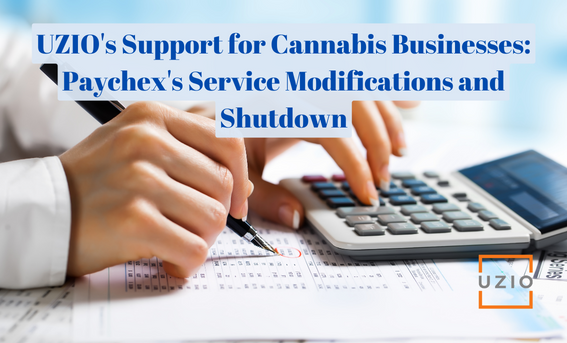Quick links
- Introduction
- Implications of Paychex's Service Modifications and Cessation
- What Does This Mean Going Forward for the Cannabis Industry?
- Factors Leading to the Fallout
- Amending the Situation: What Can Cannabis Businesses Do
- Lessons Learned for the Cannabis Businesses
- Examining the Strategic Position of the Cannabis Industry: A SWOT Analysis
- How UZIO Can Help Cannabis Companies Navigate the Challenges
- Conclusion
1. Introduction
The recent decision by Paychex and other mainstream payroll providers to modify or cease their services for cannabis businesses has significant implications for the industry. This article explores the implications of Paychex’s actions, what it means for cannabis businesses going forward, the factors leading up to this fallout, steps businesses can take to address the situation, and the lessons to be learned.
2. Implications of Paychex's Service Modifications and Cessation
Paychex’s modifications and cessation of services have profound implications for cannabis businesses:
- Disrupted Payroll and HR Operations:
The sudden change in service availability can disrupt the smooth functioning of payroll and HR operations for cannabis companies. Managing payroll processing, tax calculations, benefits administration, and compliance without the support of mainstream providers can lead to delays, potential errors, and increased administrative burden. - Increased Compliance and Regulatory Challenges:
Cannabis businesses already face complex and evolving compliance requirements. The withdrawal of services from mainstream providers adds an additional compliance burden, requiring businesses to navigate the intricacies of tax filings, employment regulations, and other compliance obligations independently. - Limited Access to HR Solutions:
Mainstream providers often offer a suite of HR solutions beyond payroll, including employee onboarding, time tracking, and benefits management. With the service modifications and cessation, cannabis businesses may lose access to these comprehensive HR solutions, requiring them to find alternative providers or develop in-house solutions. - Reputational Risks and Stigma:
The actions taken by mainstream providers can perpetuate the stigma associated with the cannabis industry. The limited availability of reputable payroll and HR services may hinder cannabis businesses in attracting top talent, securing financial partnerships, and maintaining a positive brand image.
3. What Does This Mean Going Forward?
The fallout with Paychex serves as a turning point for the cannabis industry, highlighting the need for specialized services tailored to its unique requirements. Going forward, cannabis businesses must seek alternative solutions to manage payroll and HR operations effectively, ensuring compliance, reliability, and scalability.
4. Factors Leading to the Fallout
Several factors have contributed to the fallout between mainstream providers and the cannabis industry:
1. Regulatory Uncertainty
Customer support is an essential consideration when choosing a white label payroll solution provider. When you’re processing payroll, you need to know that you can rely on the provider to support you in case of any issues. A provider with excellent customer support can help you resolve issues quickly and ensure that your payroll is processed accurately and on time.
When evaluating customer support, consider the types of support that are available. Is there a dedicated support team that you can contact by phone or email? Is there an online support center that you can access for self-help resources? Is support available 24/7? Additionally, consider the provider’s reputation for customer support. Are they known for providing excellent support, or do they have a poor reputation in this area?
2. Risk and Compliance Concerns
Compliance with cannabis-specific regulations presents unique challenges. Mainstream providers may have found it difficult to fully meet the compliance needs of the industry due to evolving laws, potential conflicts with federal regulations, and increased scrutiny from financial institutions.
3. Reputational Considerations
Maintaining relationships with cannabis businesses can impact the reputation and risk profile of mainstream providers. Concerns over potential reputational risks and the need to cater to diverse client bases across industries may have influenced their decision to modify or cease services for the cannabis sector.
5. Amending the Situation: What Can Cannabis Businesses Do?
To address the fallout and mitigate its impact, cannabis businesses can take the following steps:
1. Seek Specialized Service Providers
Explore specialized payroll and HR service providers, such as UZIO, that understand the unique needs and compliance requirements of the cannabis industry. Partnering with providers that offer tailored solutions can help businesses regain stability and streamline operations.
2. Prioritize Compliance Expertise
Engage with service providers well-versed in cannabis regulations to ensure compliance at all levels. Stay updated on changing laws and maintain diligent reporting practices to navigate the complex compliance landscape effectively.
3. Embrace Technology and Automation
Leverage technology solutions that automate payroll and HR processes, reducing manual errors and improving efficiency. Implementing integrated systems can streamline data management, payroll calculations, tax reporting, and compliance tracking, allowing cannabis businesses to focus on strategic growth initiatives.
4. Build Strategic Partnerships
Forge partnerships with service providers and industry organizations that specialize in supporting the cannabis sector. Collaborating with experts who understand the unique challenges and compliance requirements of the industry can provide valuable guidance and support.
5. Advocate for Industry Recognition
Cannabis businesses can collectively work towards gaining industry recognition and legitimacy. By actively engaging in advocacy efforts, participating in trade associations, and supporting regulatory initiatives, the industry can foster a positive image and influence policies that facilitate access to essential services.
6. Lessons Learned for the Cannabis Businesses
1. Diversify Service Providers
Relying solely on mainstream providers may expose businesses to vulnerabilities. Building a network of specialized service providers ensures continuity and reduces dependence on a single source.
2. Proactive Compliance Management
Staying ahead of evolving regulations and compliance requirements is crucial. Cannabis businesses must proactively invest in compliance expertise and systems to navigate the complex legal landscape successfully.
3. Adaptability and Resilience
The cannabis industry has faced numerous challenges, and resilience is key to overcoming obstacles. Being adaptable to changes, seeking innovative solutions, and forging strategic partnerships will help businesses weather uncertainties and thrive in a rapidly evolving market.
7. Examining the Strategic Position of the Cannabis Industry: A SWOT Analysis
| Strengths | Weaknesses |
|---|---|
| Increasing legalization and acceptance of cannabis | Disrupted payroll and HR operations |
| Growing market demand and revenue potential | Increased compliance and regulatory challenges |
| Innovative product offerings | Limited access to HR solutions |
| Strong consumer interest and loyalty | Reputational risks and stigma |
| Opportunities | Threats |
| Seek specialized service providers | Regulatory uncertainty |
| Prioritize compliance expertise | Risk and compliance concerns |
| Embrace technology and automation | Reputational considerations |
| Build strategic partnerships | Financial and banking restrictions |
| Advocate for industry recognition | Supply and demand volatility |
8. How UZIO Can Help Cannabis Companies Navigate the Challenges
In light of the implications caused by Paychex’s service modifications and cessation, UZIO emerges as a trusted partner, offering solutions to help cannabis companies navigate these challenges effectively:
1. Comprehensive Payroll and HR Services
UZIO provides a comprehensive suite of payroll and HR services tailored specifically for the cannabis industry. From payroll processing and tax compliance to benefits administration and employee self-service, UZIO offers a range of solutions to meet the unique needs of cannabis companies.
2. Compliance Expertise
With a deep understanding of the cannabis regulatory landscape, UZIO helps businesses stay compliant with industry-specific regulations. The platform integrates up-to-date compliance features, ensuring accurate reporting, adherence to tax obligations, and compliance with state and federal employment laws.
3. Seamless Transition and Integration
UZIO’s platform facilitates a seamless transition for cannabis companies, ensuring minimal disruption to their operations. The platform easily integrates with existing systems, allowing for a smooth onboarding process and minimizing any potential gaps in payroll and HR management.
4. Focus on Growth and Scalability
UZIO’s solutions are designed to support the growth and scalability of cannabis businesses. The platform adapts to evolving needs, enabling businesses to streamline operations, optimize workforce management, and focus on their core growth strategies within the industry.
Recommended Reading: Biggest pain point with Payroll and HR software
9. Conclusion
The modifications and cessation of services by Paychex and other mainstream payroll providers have far-reaching implications for cannabis businesses. However, UZIO emerges as a reliable partner, offering tailored payroll and HR solutions to help cannabis companies navigate these challenges effectively. By providing comprehensive services, expertise in compliance, seamless integration, and a focus on growth, UZIO empowers cannabis businesses to overcome the limitations.
To know more about UZIO payroll solution for the Cannabis Industry and get in touch with us for an expert-led demo.















